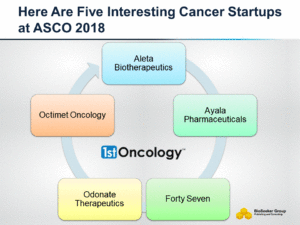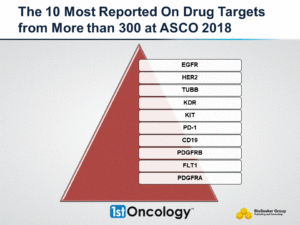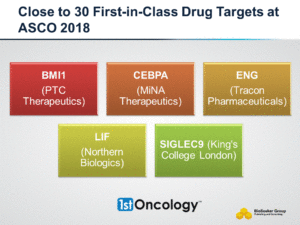On June 4, 2018 Clovis Oncology, Inc. (NASDAQ: CLVS) reported the submission of a regulatory application to the European Medicines Agency (EMA), as part of a type II variation seeking to expand the marketing authorization for Rubraca (rucaparib) to include maintenance treatment of adult patients with recurrent epithelial ovarian, fallopian tube, or primary peritoneal cancer who are in a complete or partial response to platinum based chemotherapy (Press release, Clovis Oncology, JUN 4, 2018, View Source [SID1234527114]).
Schedule your 30 min Free 1stOncology Demo!
Discover why more than 1,500 members use 1stOncology™ to excel in:
Early/Late Stage Pipeline Development - Target Scouting - Clinical Biomarkers - Indication Selection & Expansion - BD&L Contacts - Conference Reports - Combinatorial Drug Settings - Companion Diagnostics - Drug Repositioning - First-in-class Analysis - Competitive Analysis - Deals & Licensing
Schedule Your 30 min Free Demo!
On May 29, 2018, Rubraca became the first PARP inhibitor licensed in the EU as a monotherapy treatment for women with recurrent ovarian cancer. It is currently indicated for adult patients with platinum sensitive, relapsed or progressive, BRCA mutated (germline and/or somatic), high-grade epithelial ovarian, fallopian tube, or primary peritoneal cancer, who have been treated with two or more prior lines of platinum based chemotherapy, and who are unable to tolerate further platinum based chemotherapy. The Rubraca Summary of Product Characteristics is available on the European Medicines Agency website.
This submission is based on the positive results from the phase 3 ARIEL3 study, which evaluated rucaparib in the ovarian cancer maintenance treatment setting among three populations: 1) BRCA mutant (BRCAmut+) 2) HRD positive inclusive of BRCAmut+ and, 3) all patients treated in ARIEL3. ARIEL3 successfully achieved its primary endpoints, extending investigator assessed progression-free survival (PFS) versus placebo in all patients treated, regardless of BRCA status. Safety findings from the ARIEL3 trial were consistent with previous clinical trials.
Based on the timing of this submission, the company anticipates an opinion from the Committee for Medicinal Products for Human Use (CHMP) by end of 2018.
About the ARIEL3 Clinical Trial
The ARIEL3 pivotal study of rucaparib is a confirmatory randomized, double-blind study comparing the effects of rucaparib against placebo to evaluate whether rucaparib given as a maintenance treatment to platinum-sensitive ovarian cancer patients can extend the period of time for which the disease is controlled after a complete or partial response to platinum-based chemotherapy. The study enrolled 564 patients with high-grade epithelial ovarian, fallopian tube or primary peritoneal cancer. To be eligible for the study, participants had to have received at least two prior platinum-based treatment regimens, been sensitive to the penultimate platinum regimen, and achieved a complete or partial response to their most recent platinum-based regimen. There were no genomic selection criteria for this study. Trial participants were randomized 2:1 to receive 600 milligrams of rucaparib twice daily (BID) or placebo.
About Rubraca (rucaparib)
Rucaparib is an oral, small molecule inhibitor of PARP1, PARP2 and PARP3 being developed in multiple tumor types, including ovarian, metastatic castration-resistant prostate, and bladder cancers, as monotherapy, and in combination with other anti-cancer agents. Exploratory studies in other tumor types are also underway. Clovis holds worldwide rights for rucaparib. Rucaparib is an unlicensed medical product outside of the U.S. and Europe.
Rubraca EU Authorized Use
Rucaparib is licensed for adult patients with platinum sensitive, relapsed or progressive, BRCA mutated (germline and/or somatic), high-grade epithelial ovarian, fallopian tube, or primary peritoneal cancer, who have been treated with two or more prior lines of platinum based chemotherapy, and who are unable to tolerate further platinum based chemotherapy.
Click here to access the current Summary of Product Characteristics. Healthcare professionals should report any suspected adverse reactions via their national reporting systems.
Rubraca U.S. FDA Approved Indications and Important Safety Information
Rubraca is indicated as monotherapy for the maintenance treatment of adult patients with recurrent epithelial ovarian, fallopian tube, or primary peritoneal cancer who are in a complete or partial response to platinum-based chemotherapy.
Rubraca is indicated as monotherapy for the treatment of adult patients with deleterious BRCA mutation (germline and/or somatic) associated epithelial ovarian, fallopian tube, or primary peritoneal cancer who have been treated with two or more chemotherapies and selected for therapy based on an FDA-approved companion diagnostic for Rubraca.
Select Important Safety Information
Myelodysplastic Syndrome (MDS)/Acute Myeloid Leukemia (AML) occur uncommonly in patients treated with Rubraca, and are potentially fatal adverse reactions. In approximately 1100 treated patients, MDS/AML occurred in 12 patients (1.1%), including those in long term follow-up. Of these, 5 occurred during treatment or during the 28-day safety follow-up (0.5%). The duration of Rubraca treatment prior to the diagnosis of MDS/AML ranged from 1 month to approximately 28 months. The cases were typical of secondary MDS/cancer therapy-related AML; in all cases, patients had received previous platinum-containing regimens and/or other DNA damaging agents.
Do not start Rubraca until patients have recovered from hematological toxicity caused by previous chemotherapy (≤ Grade 1).
Monitor complete blood counts for cytopenia at baseline and monthly thereafter for clinically significant changes during treatment. For prolonged hematological toxicities (> 4 weeks), interrupt Rubraca or reduce dose (see Dosage and Administration (2.2) in full Prescribing Information) and monitor blood counts weekly until recovery. If the levels have not recovered to Grade 1 or less after 4 weeks or if MDS/AML is suspected, refer the patient to a hematologist for further investigations, including bone marrow analysis and blood sample for cytogenetics. If MDS/AML is confirmed, discontinue Rubraca.
Based on its mechanism of action and findings from animal studies, Rubraca can cause fetal harm when administered to a pregnant woman. Apprise pregnant women of the potential risk to a fetus. Advise females of reproductive potential to use effective contraception during treatment and for 6 months following the last dose of Rubraca.
Most common adverse reactions in ARIEL3 (≥ 20%; Grade 1-4) were nausea (76%), fatigue/asthenia (73%), abdominal pain/distention (46%), rash (43%), dysgeusia (40%), anemia (39%), AST/ALT elevation (38%), constipation (37%), vomiting (37%), diarrhea (32%), thrombocytopenia (29%), nasopharyngitis/upper respiratory tract infection (29%), stomatitis (28%), decreased appetite (23%), and neutropenia (20%).
Most common laboratory abnormalities in ARIEL3 (≥ 25%; Grade 1-4) were increase in creatinine (98%), decrease in hemoglobin (88%), increase in cholesterol (84%), increase in alanine aminotransferase (ALT) (73%), increase in aspartate aminotransferase (AST) (61%), decrease in platelets (44%), decrease in leukocytes (44%), decrease in neutrophils (38%), increase in alkaline phosphatase (37%), and decrease in lymphocytes (29%).
Most common adverse reactions in Study 10 and ARIEL2 (≥ 20%; Grade 1-4) were nausea (77%), asthenia/fatigue (77%), vomiting (46%), anemia (44%), constipation (40%), dysgeusia (39%), decreased appetite (39%), diarrhea (34%), abdominal pain (32%), dyspnea (21%), and thrombocytopenia (21%).
Most common laboratory abnormalities in Study 10 and ARIEL2 (≥ 35%; Grade 1-4) were increase in creatinine (92%), increase in alanine aminotransferase (ALT) (74%), increase in aspartate aminotransferase (AST) (73%), decrease in hemoglobin (67%), decrease in lymphocytes (45%), increase in cholesterol (40%), decrease in platelets (39%), and decrease in absolute neutrophil count (35%).
Co-administration of rucaparib can increase the systemic exposure of CYP1A2, CYP3A, CYP2C9, or CYP2C19 substrates, which may increase the risk of toxicities of these drugs. Adjust dosage of CYP1A2, CYP3A, CYP2C9, or CYP2C19 substrates, if clinically indicated. If co-administration with warfarin (a CYP2C9 substrate) cannot be avoided, consider increasing frequency of international normalized ratio (INR) monitoring.
Because of the potential for serious adverse reactions in breast-fed children from Rubraca, advise lactating women not to breastfeed during treatment with Rubraca and for 2 weeks after the last dose.
You may report side effects to the FDA at 1-800-FDA-1088 or www.fda.gov/medwatch. You may also report side effects to Clovis Oncology, Inc. at 1-844-258-7662.
Click here for full Prescribing Information and additional Important Safety Information.



